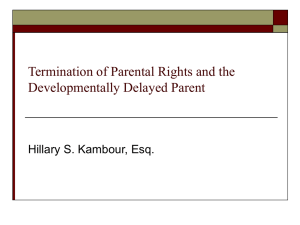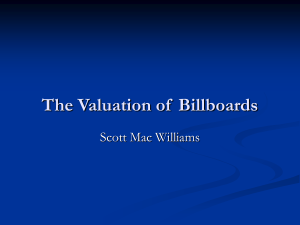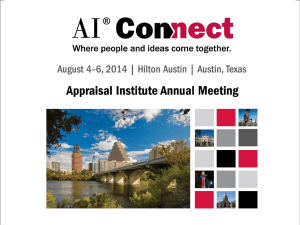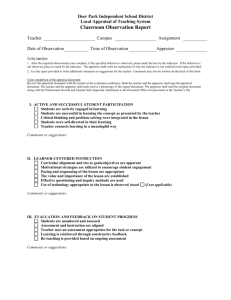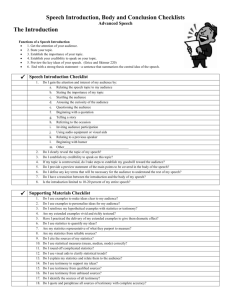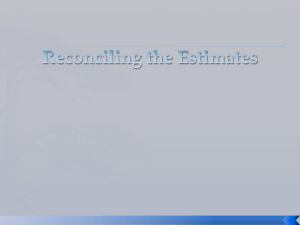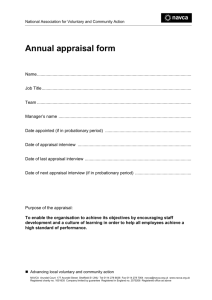The Appraiser As Testifying or Consulting Expert
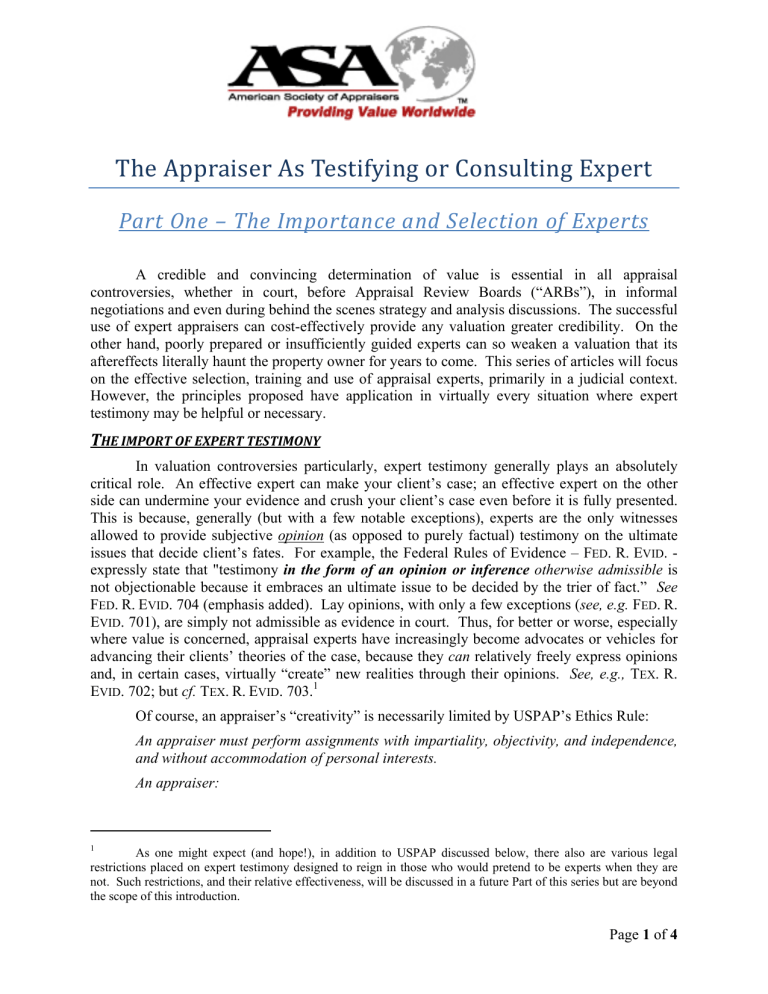
The Appraiser As Testifying or Consulting Expert
Part One – The Importance and Selection of Experts
A credible and convincing determination of value is essential in all appraisal controversies, whether in court, before Appraisal Review Boards (“ARBs”), in informal negotiations and even during behind the scenes strategy and analysis discussions. The successful use of expert appraisers can cost-effectively provide any valuation greater credibility. On the other hand, poorly prepared or insufficiently guided experts can so weaken a valuation that its aftereffects literally haunt the property owner for years to come. This series of articles will focus on the effective selection, training and use of appraisal experts, primarily in a judicial context.
However, the principles proposed have application in virtually every situation where expert testimony may be helpful or necessary.
T HE IMPORT OF EXPERT TESTIMONY
In valuation controversies particularly, expert testimony generally plays an absolutely critical role. An effective expert can make your client’s case; an effective expert on the other side can undermine your evidence and crush your client’s case even before it is fully presented.
This is because, generally (but with a few notable exceptions), experts are the only witnesses allowed to provide subjective opinion
(as opposed to purely factual) testimony on the ultimate issues that decide client’s fates. For example, the Federal Rules of Evidence – F ED .
R.
E VID . - expressly state that "testimony in the form of an opinion or inference otherwise admissible
is not objectionable because it embraces an ultimate issue to be decided by the trier of fact.”
See
F ED .
R.
E VID . 704 (emphasis added). Lay opinions, with only a few exceptions ( see, e.g.
F ED .
R.
E
VID
. 701), are simply not admissible as evidence in court. Thus, for better or worse, especially where value is concerned, appraisal experts have increasingly become advocates or vehicles for advancing their clients’ theories of the case, because they can relatively freely express opinions and, in certain cases, virtually “create” new realities through their opinions. See, e.g., T
EX
.
R.
E
VID
. 702; but cf.
T
EX
.
R.
E
VID
. 703.
1
Of course, an appraiser’s “creativity” is necessarily limited by USPAP’s Ethics Rule:
An appraiser must perform assignments with impartiality, objectivity, and independence, and without accommodation of personal interests.
An appraiser:
1
As one might expect (and hope!), in addition to USPAP discussed below, there also are various legal restrictions placed on expert testimony designed to reign in those who would pretend to be experts when they are not. Such restrictions, and their relative effectiveness, will be discussed in a future Part of this series but are beyond the scope of this introduction.
Page 1 of 4
must not perform an assignment with bias;
must not advocate the cause or interest of any party or issue;
must not accept an assignment that includes the reporting of predetermined opinions and conclusions…;
must not communicate assignment results with the intent to mislead or to defraud;
must not use or communicate a report that is known by the appraiser to be misleading or fraudulent;
must not knowingly permit an employee or other person to communicate a misleading or fraudulent report…; and
must not perform an assignment in a grossly negligent manner.
That said, the concept of “value” is necessarily somewhat subjective, even under the best of circumstances, and any time subjectivity is introduced into a courtroom or other presumed
“fact finding” exercise, the powers of informed opinions are magnified. In the case of appraisals and judicial determinations of value especially, there is a real need for application of “educated subjectivity,” provided it is exercised in a scrupulously professional and ethical manner.
Many owners have a fundamental belief that they don’t need to retain appraisal experts.
They feel they understand the value of their assets, and perhaps on an emotional or even
“common sense” level, they do. However, when confronted with the principles and constraints of USPAP or the need to truly factually justify their opinions of value, most owners are left with just unsupported lay opinions which may not even be legally sufficient to support a favorable verdict. Even where an owner can express an opinion on the value of his or her own property, in most cases, such opinions can be both undermined and overwhelmed by the weight of competent expert testimony of value.
Consequently, there is a recognized need for effective appraisal experts in judicial and other valuation controversies. However, an "effective" expert is not necessarily a "good" expert.
Even an average expert who is not successfully cross-examined or otherwise discredited by the other side can become an "effective" expert in trial or negotiations. The goal of this series is to encourage those who would make the leap into the role of testifying or consulting experts in valuation controversies to do so “effectively” with eyes wide open and with full awareness of the various responsibilities and techniques involved. The first hurdle, of course, is to honestly determine whether the aspiring “expert” really has the capacity and qualifications to claim to be an expert at all.
W
HAT MAKES AN APPRAISER AN EXPERT
?
Legally, the test of “expertise” is fairly broad and somewhat loose. Virtually any accredited appraiser will satisfy the legal test. For example:
A witness who is qualified as an expert by knowledge, skill, experience, training, or education may testify thereto in the form of an opinion or otherwise if:
Page 2 of 4
a. the expert’s scientific, technical, or other specialized knowledge will help the trier of fact to understand the evidence or to determine a fact in issue; b. the testimony is based upon sufficient facts or data; c. the testimony is the product of reliable principles and methods; and d. the witness has reliably applied the principles and methods to the facts of the case.
T EX .
R.
E VID . 702
The fact is, in some situations, “… the witness's [mere] skill and experience alone may provide a sufficient basis for the expert's opinion.”
See
, e.g., Volkswagen v. Ramirez
, 159
S.W.3d 897 (Tex. 2004). Practically, however, because expertise, like beauty, is most often determined in the eye of the beholder, more goes into the selection of an expert appraiser than just his or her academic prowess. Jury studies repeatedly affirm that if the expert does not appear
credible, his testimony will be less persuasive. Also, much of the world’s knowledge remains functionally useless because it remains ineffectively communicated, and knowledge of value is no exception. Finally, arrogance or condensation on the part of any witness can be the kiss of death to her or his believability. More clearly needs to go into the selection of an expert than mere technical knowledge.
As an attorney, I am frequently charged with the responsibility of selecting experts to support my clients’ cases in court (“testifying experts”). I also hire experts to consult with and educate me behind the scenes on the technical aspects of a case, and to assist me in critiquing my
(and my opponents’) testifying experts’ reports and testimony and preparing effective cross examination (“consulting experts”). Because they serve different purposes, I sometimes select testifying and consulting experts based on different criteria. Nevertheless, all “effective” experts should have at least the following fundamental characteristics in common:
1.
Unquestioned integrity;
2.
Sufficient technical knowledge and professionalism;
3.
Above-average communication abilities (written and verbal);
4.
Competent appearance;
5.
Significant professional honors, including peer-reviewed publications (ideally on topic) and, preferably, some academic affiliation or other instructional experience;
6.
Knowledge of limitations and a reluctance to “fake it;”
7.
Excellent results (recognizing not every case is winnable, we look for competent and effective showings and will seek references from other attorneys and colleagues);
8.
Appropriate sense of humor and humanity; and
9.
“Coachability.”
These characteristics should not require a great deal of discussion. However, some clarification may be in order. Primarily, the ability to accept coaching is in no way inconsistent with maintaining integrity. Indeed, the two concepts, applied properly, should be mutually supportive, and a case in point should serve as a word to the wise.
Page 3 of 4
Years ago, we were seeking an appraiser for a large power plant. This is not a line of work where we have found a lot of truly capable experts. However, there were a number of appraisers willing to throw their hats in the ring to try to get the work, so we decided to test some fresh waters and brought in a representative of a large industrial appraisal firm for an interview.
One iron clad rule we have is “one appraisal; one expert.” We are fine with other appraisers contributing to the single testifying appraiser’s report and testimony, but the actual witness must be fully prepared to testify on each aspect of her or his “company” appraisal. This is mainly because cross-examination in our jurisdiction is unlimited. For an appraiser who specializes in and testifies only to the cost approach, opposing counsel nevertheless enjoys free reign to question that witness on all he or she did not
do and does not
know about, for example, the income approach as it could apply to the property. It is no answer, in our minds, to defer to a colleague in that situation. Knowing our bias, the company still insisted on presenting us with a team of appraisers (along with, of course, a host of duplicative learning curves and potential expenses). They did not get the job. They disregarded our coaching and, in turn, compromised their credibility.
It is no good to pretend to be an expert. Truth is not determined by anyone’s
mere “say so.” To be a true expert whose opinions are worthy of admissibility and credibility in a judicial or other valuation controversy, the expert’s work must be:
Qualified
– expert must be qualified to state the opinion offered.
Relevant
– testimony must be sufficiently tied to the facts of the case.
Reliable
– testimony must be grounded in the accepted technical method
.
See, e.g., Daubert v. Merrell Dow Pharmaceuticals, Inc.,
509 U.S. 579 (1993).
We will look closely at those requirements in the next Part of this series.
About the Author: Tom Countryman, Senior Counsel at
Norton Rose Fulbright (Fulbright & Jaworski LLP) in San
Antonio, has over 30 years’ experience trying complex commercial cases and specializes in the nationwide recruitment, training and use of experts in property tax, energy, financial services and products liability lawsuits. Tom is a member of the
Institute of Professionals in Taxation and was named one of
“San Antonio’s Best Lawyers” (San Antonio Monthly (2007)) and a “Texas Top Rated Lawyer,” LexisNexis
Martindale-
Hubbell
(2012-2013).
Thomas A. Countryman | Sr. Counsel
Fulbright & Jaworski LLP
300 Convent Street, Suite 2100, San Antonio, Texas 78205
Tel +1 210 270 7121 | Fax +1 210 270 7205 mailto:tom.countryman@nortonrosefulbright.com
Page 4 of 4
